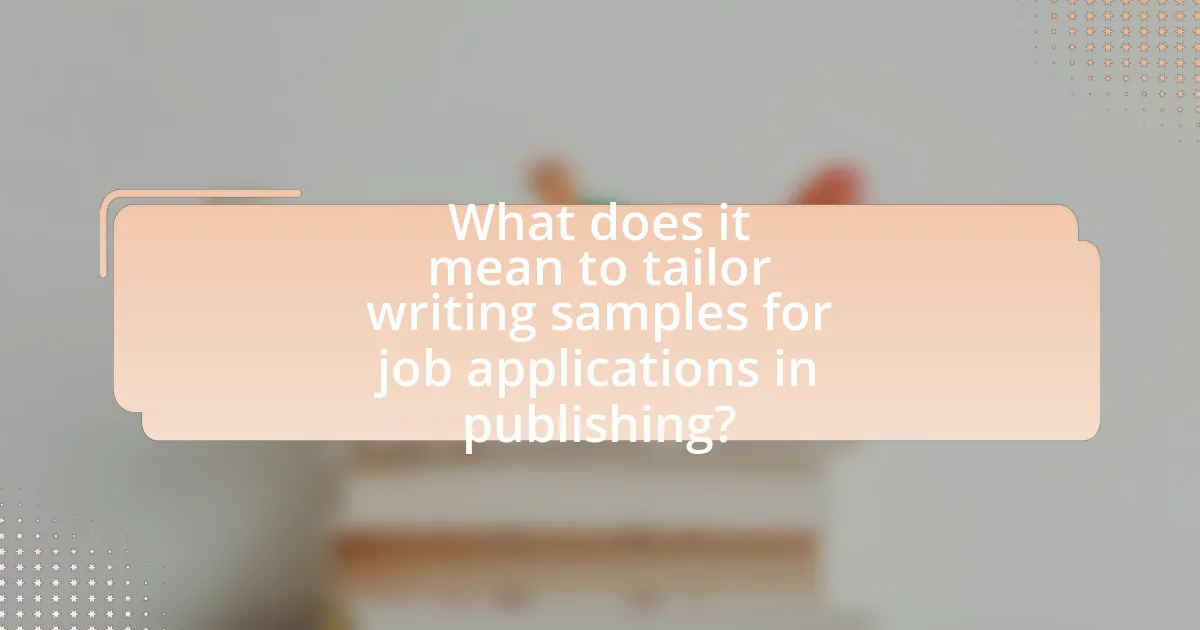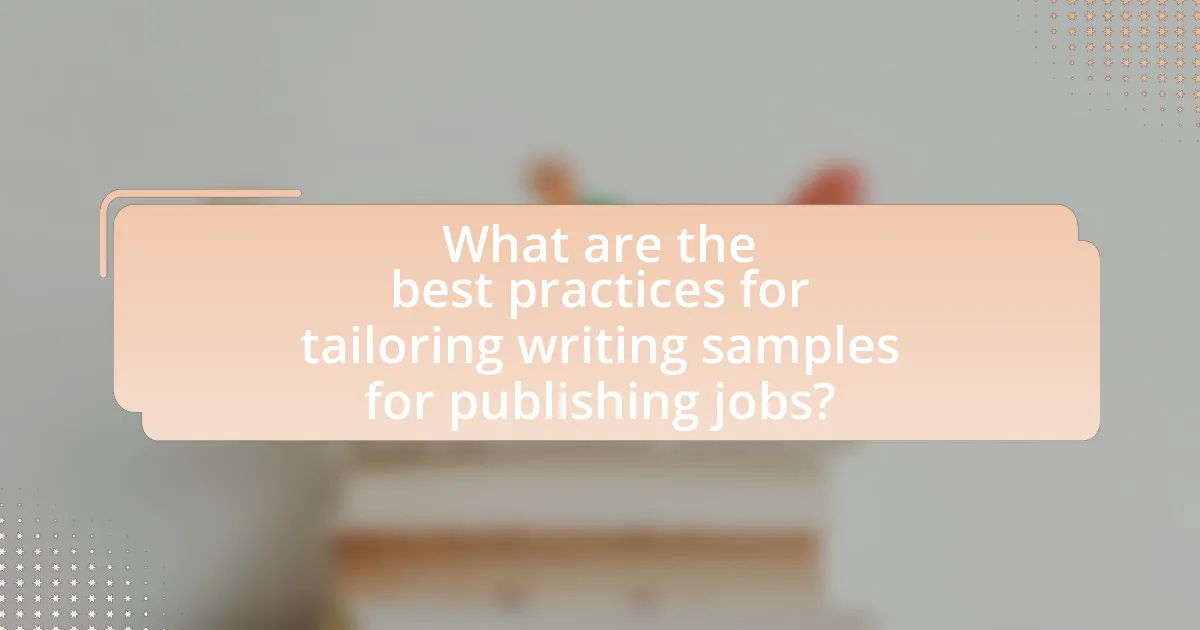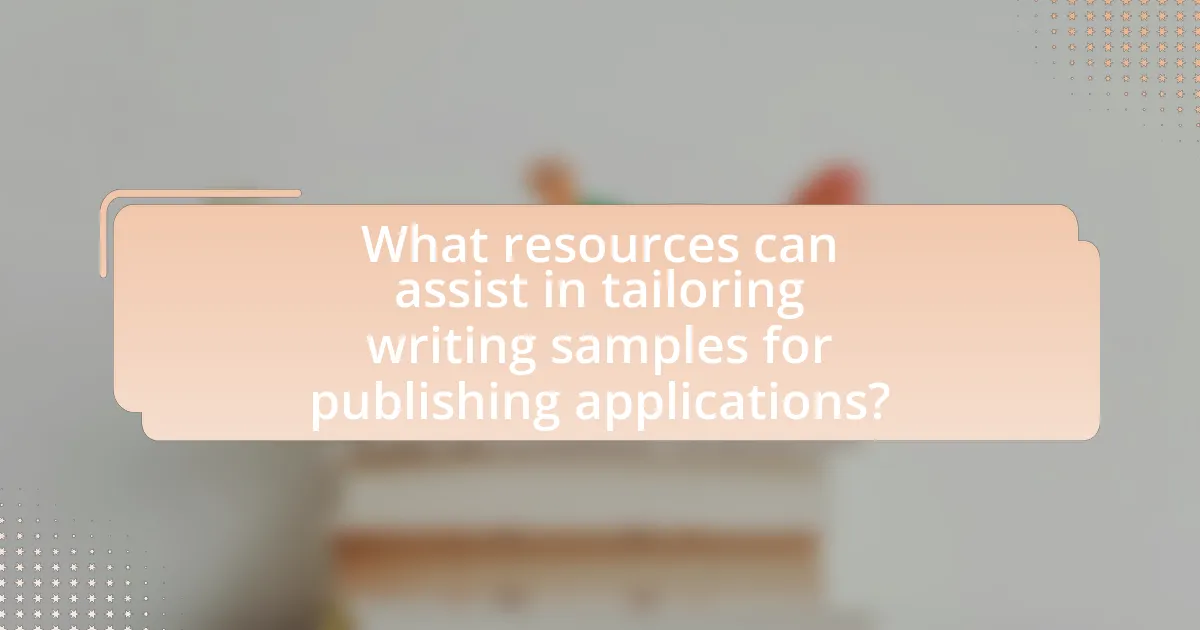Tailoring writing samples for job applications in publishing involves customizing submitted work to meet the specific requirements and preferences of the publishing house or position. This process is essential as it demonstrates a candidate’s understanding of the industry, enhances their appeal to hiring managers, and increases the likelihood of securing interviews. Key elements of effective writing samples include clarity, originality, and relevance, while common mistakes to avoid include using generic samples and neglecting submission guidelines. The article also discusses strategies for selecting appropriate samples, assessing one’s portfolio, and utilizing resources to improve writing quality, ultimately emphasizing the importance of aligning writing samples with the target publication’s voice and audience.

What does it mean to tailor writing samples for job applications in publishing?
Tailoring writing samples for job applications in publishing means customizing the submitted work to align with the specific requirements and preferences of the publishing house or position. This involves selecting pieces that demonstrate relevant skills, themes, and styles that resonate with the target audience or the editorial focus of the publisher. For instance, if applying to a literary magazine that emphasizes contemporary fiction, a candidate should provide samples that showcase their proficiency in that genre, thereby increasing their chances of making a favorable impression.
Why is tailoring writing samples important for job applications in publishing?
Tailoring writing samples is crucial for job applications in publishing because it demonstrates a candidate’s understanding of the specific requirements and audience of the position. By customizing samples to align with the publisher’s style, genre, and target demographic, applicants can effectively showcase their relevant skills and adaptability. Research indicates that hiring managers prioritize candidates who can clearly articulate their fit for the role, as evidenced by a survey from the National Association of Colleges and Employers, which found that 70% of employers value tailored applications over generic ones. This strategic approach increases the likelihood of standing out in a competitive field.
How does a tailored writing sample reflect an applicant’s understanding of the publishing industry?
A tailored writing sample demonstrates an applicant’s understanding of the publishing industry by showcasing their ability to align content with specific audience needs and industry standards. This alignment indicates familiarity with genre conventions, target demographics, and current market trends, which are essential for successful publishing. For instance, an applicant who submits a writing sample that mirrors the style and tone of a specific publication shows they have researched that outlet and understand its readership, thereby reflecting their knowledge of the industry’s nuances.
What impact does a customized writing sample have on hiring decisions?
A customized writing sample significantly enhances hiring decisions by demonstrating a candidate’s ability to meet specific job requirements and align with the company’s voice. Tailored samples showcase relevant skills and knowledge, making candidates more appealing to employers. Research indicates that 70% of hiring managers prefer candidates who provide writing samples that reflect the job’s demands, as these samples allow for a direct assessment of a candidate’s fit for the role. This targeted approach not only highlights a candidate’s strengths but also indicates their commitment and understanding of the position, ultimately influencing hiring outcomes positively.
What are the key elements of effective writing samples in publishing?
Effective writing samples in publishing must demonstrate clarity, originality, and relevance. Clarity ensures that the writing is easily understood, which is crucial for engaging readers and conveying messages effectively. Originality showcases the writer’s unique voice and perspective, setting them apart from other candidates. Relevance involves tailoring the content to the specific audience or publication, aligning with their style and subject matter. These elements are essential because they reflect the writer’s ability to communicate effectively within the publishing industry, which values both creativity and precision.
What types of writing samples are most relevant for publishing job applications?
The most relevant types of writing samples for publishing job applications include published articles, blog posts, editorial pieces, and book excerpts. These samples demonstrate a candidate’s ability to write for specific audiences, adhere to editorial standards, and showcase their unique voice and style. For instance, published articles provide evidence of experience in meeting deadlines and working with editors, while blog posts can highlight a candidate’s engagement with current trends and topics in the publishing industry. Additionally, editorial pieces reflect critical thinking and the ability to analyze content, and book excerpts can illustrate narrative skills and creativity. Collectively, these samples offer a comprehensive view of a candidate’s writing capabilities and suitability for roles in publishing.
How should the tone and style of writing samples align with the target publishing house?
The tone and style of writing samples should closely reflect the specific preferences and branding of the target publishing house. Each publishing house has a distinct voice and audience, which can be identified through their published works, editorial guidelines, and marketing materials. For example, a literary fiction publisher may favor a more nuanced and poetic style, while a commercial publisher might prefer a straightforward and engaging tone. Aligning writing samples with these characteristics demonstrates an understanding of the publisher’s identity and increases the likelihood of a positive reception.
How can applicants identify the right writing samples to tailor?
Applicants can identify the right writing samples to tailor by analyzing the job description and requirements of the position they are applying for. This involves closely examining the skills, themes, and styles emphasized in the job listing and selecting samples that best demonstrate their proficiency in those areas. For instance, if a job emphasizes narrative storytelling, applicants should choose samples that showcase their ability to craft compelling narratives. Research indicates that tailored applications increase the likelihood of securing interviews, as employers prefer candidates who align their skills with the specific needs of the role.
What strategies can be used to analyze job descriptions for writing sample requirements?
To analyze job descriptions for writing sample requirements, one effective strategy is to identify key skills and competencies explicitly mentioned in the job listing. This involves closely examining the language used in the description to determine the specific writing styles, formats, and subject matter that the employer values. For instance, if a job description emphasizes “creative writing” or “technical documentation,” candidates should tailor their writing samples to reflect these styles.
Additionally, candidates should look for any stated preferences regarding the length and type of writing samples, such as articles, reports, or essays. By aligning their samples with these requirements, candidates can demonstrate their suitability for the role. Research indicates that tailoring application materials to match job descriptions significantly increases the likelihood of securing an interview, as it shows the employer that the candidate understands the role and can meet its demands.
How can applicants assess their own writing portfolio for relevance and strength?
Applicants can assess their own writing portfolio for relevance and strength by evaluating the alignment of their samples with the specific requirements of the job they are applying for. This involves reviewing each piece for its thematic relevance, style consistency, and audience engagement, ensuring that the work reflects the skills and topics pertinent to the publishing industry.
To validate this assessment, applicants should compare their writing samples against job descriptions and industry standards, noting the types of content that are most frequently requested. For instance, if a job emphasizes narrative skills, applicants should highlight their strongest storytelling pieces. Additionally, seeking feedback from peers or mentors can provide external perspectives on the portfolio’s effectiveness, further reinforcing its relevance and strength.

What are the best practices for tailoring writing samples for publishing jobs?
The best practices for tailoring writing samples for publishing jobs include selecting relevant pieces that align with the specific job description, showcasing versatility in writing styles, and adhering to submission guidelines. By choosing samples that reflect the type of content the publisher produces, candidates demonstrate their understanding of the target audience and the publication’s voice. Additionally, including a variety of writing styles, such as articles, essays, or creative pieces, can illustrate adaptability and skill. Following submission guidelines, such as word count and formatting, is crucial as it reflects professionalism and attention to detail, which are essential traits in the publishing industry.
How can applicants effectively customize their writing samples?
Applicants can effectively customize their writing samples by aligning the content and style with the specific requirements of the job they are applying for. This involves researching the target publication or organization to understand its tone, audience, and subject matter preferences. For instance, if a job posting emphasizes a need for engaging storytelling, applicants should select or adapt samples that showcase their narrative skills. Additionally, incorporating relevant keywords from the job description into the writing sample can demonstrate a clear connection to the role. Tailoring writing samples in this manner not only highlights the applicant’s suitability but also reflects their understanding of the publication’s unique voice and mission.
What specific adjustments should be made to align with the job’s focus area?
To align with the job’s focus area in publishing, candidates should customize their writing samples to reflect the specific genre and style relevant to the position. This involves selecting pieces that demonstrate familiarity with the target audience and adherence to industry standards, such as tone, format, and content structure. For instance, if applying for a role in children’s publishing, including samples that showcase engaging narratives and age-appropriate language is essential. Research indicates that tailored applications significantly increase the likelihood of securing interviews, as hiring managers prioritize candidates who exhibit a clear understanding of the job’s requirements and the publishing landscape.
How can feedback from peers enhance the tailoring process?
Feedback from peers can enhance the tailoring process by providing diverse perspectives that identify strengths and weaknesses in writing samples. This collaborative input allows writers to refine their work, ensuring it aligns more closely with industry standards and expectations. For instance, peer reviews can highlight areas where clarity or engagement can be improved, which is crucial in the competitive field of publishing. Studies show that peer feedback significantly increases the quality of written content, as it encourages critical thinking and fosters a deeper understanding of audience needs.
What common mistakes should applicants avoid when tailoring writing samples?
Applicants should avoid using generic writing samples that do not align with the specific job or publication they are applying to. Tailoring writing samples means selecting pieces that demonstrate relevant skills and styles suited to the target audience and publication’s voice. For instance, submitting a formal academic article for a creative writing position fails to showcase the applicant’s adaptability and understanding of the publication’s needs. Additionally, applicants should refrain from neglecting to edit and proofread their samples, as errors can undermine their professionalism and attention to detail. Research indicates that 70% of hiring managers consider writing quality a critical factor in the selection process, emphasizing the importance of polished and relevant samples.
How can generic writing samples undermine an application?
Generic writing samples can undermine an application by failing to demonstrate the applicant’s unique voice and suitability for the specific role. When writing samples lack specificity, they do not showcase the applicant’s understanding of the target audience or the nuances of the publishing industry, which are critical for success in this field. Research indicates that tailored samples significantly increase the likelihood of positive hiring outcomes, as they reflect the applicant’s ability to engage with the specific content and style required by the employer. Therefore, generic samples can lead to perceptions of a lack of effort or genuine interest, ultimately diminishing the applicant’s chances of being selected.
What pitfalls exist in failing to follow submission guidelines?
Failing to follow submission guidelines can lead to immediate rejection of a manuscript or application. Publishers and hiring managers often use these guidelines to assess professionalism and attention to detail; non-compliance signals a lack of respect for their processes. For instance, a study by the Editorial Freelancers Association found that 70% of submissions that did not adhere to guidelines were rejected outright. This highlights the critical importance of following specified formats, word counts, and submission methods to avoid losing opportunities in the competitive publishing industry.

What resources can assist in tailoring writing samples for publishing applications?
Resources that can assist in tailoring writing samples for publishing applications include style guides, writing workshops, and online platforms that offer feedback. Style guides, such as The Chicago Manual of Style and the Associated Press Stylebook, provide specific formatting and stylistic standards that are crucial for publishing. Writing workshops, often hosted by universities or professional organizations, offer personalized critiques and guidance on how to refine writing samples to meet industry expectations. Online platforms like Scribophile and Wattpad allow writers to share their work and receive constructive feedback from peers, which can help in adjusting samples to better fit the target publication’s audience and tone. These resources collectively enhance the quality and relevance of writing samples for successful publishing applications.
What tools and platforms can help improve writing samples?
Grammarly, Hemingway Editor, and ProWritingAid are effective tools and platforms that can significantly improve writing samples. Grammarly offers real-time grammar and style suggestions, enhancing clarity and correctness, while Hemingway Editor focuses on readability and conciseness, helping writers simplify complex sentences. ProWritingAid combines grammar checking with in-depth reports on writing style, structure, and readability, providing comprehensive feedback. These tools are widely used by writers and professionals to refine their work, ensuring that writing samples meet high standards expected in the publishing industry.
How can writing workshops or courses enhance writing skills for publishing?
Writing workshops or courses enhance writing skills for publishing by providing structured feedback, expert guidance, and targeted practice. Participants receive critiques from instructors and peers, which helps identify strengths and weaknesses in their writing. This feedback loop fosters improvement and refines skills necessary for publishing, such as clarity, style, and audience engagement. Additionally, workshops often focus on specific genres or formats relevant to publishing, allowing writers to tailor their work to industry standards. Research indicates that writers who engage in workshops show significant improvement in their writing quality, as evidenced by studies that demonstrate enhanced clarity and coherence in participants’ submissions post-workshop.
What role do online communities play in providing feedback on writing samples?
Online communities play a crucial role in providing feedback on writing samples by offering diverse perspectives and constructive criticism. These platforms enable writers to share their work with a broad audience, facilitating peer review that can highlight strengths and weaknesses in writing. Research indicates that feedback from multiple sources can enhance the quality of writing, as it allows authors to identify areas for improvement that they may not have recognized independently. For instance, a study published in the Journal of Writing Research found that writers who engaged with online critique groups reported significant improvements in their writing skills and confidence. This collaborative environment fosters learning and growth, making online communities an invaluable resource for writers seeking to refine their samples for job applications in publishing.
What are some final tips for creating impactful writing samples for publishing jobs?
To create impactful writing samples for publishing jobs, focus on showcasing your best work that aligns with the specific requirements of the job. Tailor each sample to reflect the style and tone of the publication you are applying to, demonstrating your understanding of their audience and content. Additionally, include a variety of writing formats, such as articles, essays, or blog posts, to highlight your versatility. Proofread meticulously to eliminate errors, as attention to detail is crucial in publishing. Research the publication’s recent articles to ensure your samples are relevant and timely, which can significantly enhance your chances of making a strong impression.
How can applicants ensure their writing samples stand out in a competitive field?
Applicants can ensure their writing samples stand out in a competitive field by tailoring their content to the specific audience and purpose of the application. This involves researching the publication or organization to understand its style, tone, and subject matter preferences, which allows applicants to align their writing samples accordingly. For instance, a study by the American Society of Journalists and Authors indicates that 70% of editors prefer submissions that reflect their publication’s voice and audience engagement. By demonstrating an understanding of the target publication’s needs and showcasing relevant skills and experiences, applicants can significantly enhance the impact of their writing samples.
What strategies can be employed to maintain authenticity while tailoring writing samples?
To maintain authenticity while tailoring writing samples, writers should focus on aligning their unique voice with the specific requirements of the job or publication. This can be achieved by thoroughly researching the target publication’s style, tone, and audience, ensuring that the tailored sample reflects these elements while still showcasing the writer’s individual perspective and strengths. For instance, a study by the American Psychological Association highlights that authenticity in writing enhances reader engagement, indicating that a genuine voice resonates more effectively with audiences. By blending personal style with the expectations of the publication, writers can create samples that are both authentic and relevant.